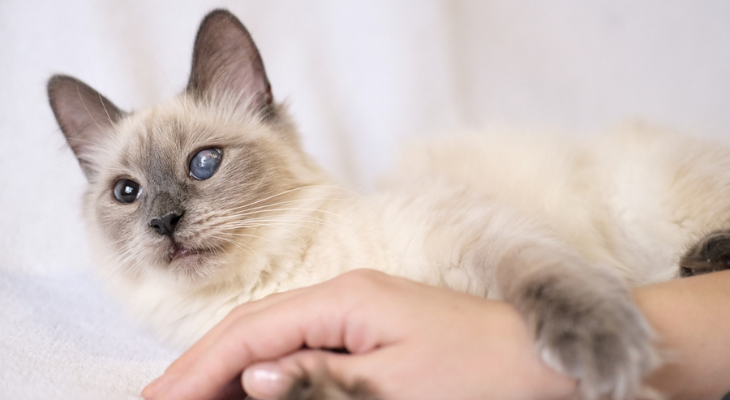
Is Your Cat Bumping Into the Walls? Cataracts Could Be the Problem
Could you find your way from the kitchen to bathroom wearing a pair of glasses smeared with grease? Unfortunately, the world can look this hazy to cats that have cataracts. Although cataracts are often associated with aging, this eye problem can also affect younger cats.
What Are Cataracts?
Cataracts occur when the clear lens inside your cat's eye becomes cloudy. The lens focuses light rays on the retina, the part of the eye that converts the rays into electrical impulses. Impulses then travel to the brain for conversion to images. If the lens is cloudy, light doesn't reach the retina uniformly, causing hazy or blurry vision.
Small cataracts may not affect your pet's vision very much, while large cataracts can have a significant impact on your pet's eyesight. Your veterinarian may use one of these classifications for your cat's cataracts:
- Incipient. The cataract only affects a small portion of the lens and doesn't interfere with vision.
- Immature. This type of cataract causes vision problems and covers 15 to 100% of the lens, according to All About Vision.
- Mature. Mature cataracts make it difficult or impossible to see because the cataract affects the entire lens.
- Hypermature. A hypermature cataract has started to shrink, due to the loss of water and protein.
Some cats are born with cataracts or have a genetic predisposition to develop them. Genetic cataracts are more likely to affect certain breeds, such as Himalayan, Persian, British Shorthair, and Birman cats, according to Cats.com.
What Are the Signs of Cataracts?
Due to cataract-related changes in vision, your cat may:
- Bump Into Furniture and Other Objects
- Eliminate Waste Next to or Near the Litterbox Instead of In It
- Struggle to Locate Food and Water Bowls
- Become More Cautious or Timid When Walking
- Have Difficulty Climbing Stairs or Jumping on Objects
- Seem Confused or Disoriented
Although cataracts often don't have any obvious signs, your pet's pupils might look cloudy or appear white or blue-gray instead of black in some cases.
What Causes Cataracts?
Just like people, cats are more likely to develop cataracts as they get older. Other cataract causes include:
- An Eye Injury
- Poor Nutrition
- High Blood Pressure
- Diabetes or Other Metabolic Diseases
- An Eye Infection
- Cancer
Uveitis, inflammation in the middle of the eye, is a common cause of cataracts in cats. Cats that have uveitis may blink or squint often. If you notice any of these signs in your cat, call the veterinarian immediately. Treating the inflammation as soon as possible will protect your pet's vision and reduce it's risk of developing cataracts.
How Are Cataracts Treated?
If inflammation or infection is to blame for your cat's cataracts, the veterinarian will prescribe eye drops that decrease inflammation or kill the germs causing the infection. Prompt treatment of inflammation is important, as inflammation can be a factor in glaucoma. Glaucoma occurs when the pressure inside the eye is too high. High pressure can damage the optic nerve, the pathway between the brain and eye, and cause permanent vision loss. Although eye drops treat inflammation and infection, your cat will still have cataracts.
It's important to treat other underlying diseases and conditions like cancer, high blood pressure, and diabetes. Treating the condition will improve your pet's health, but won't get rid of the cataracts.
No matter what the cause of your cat's cataracts is, your veterinarian may recommend surgery if your pet is having trouble seeing. During cataract surgery, a veterinarian removes the cloudy lens and replaces it with an artificial lens. Surgery isn't an option for all cats, as animals must be healthy enough to tolerate a surgical procedure. As part of the pre-surgery preparation, your veterinarian will order a blood test. The blood test can detect kidney disease and other diseases and conditions that may affect your pet's health.
Surgery isn't always needed for cataracts. If the cataract doesn't affect your pet's eyesight, your veterinarian may suggest watching and waiting. Should the cataract grow larger, surgery may be the best option at that point.
Are you worried that your cat may have cataracts? A trip to the veterinarian can help you determine why your pet's behavior has changed. Contact our office to schedule your furry friend's appointment.
Sources:
All About Vision: Cat Cataracts: Causes, Symptoms, Treatment and Prevention, 10/13/2021
https://www.allaboutvision.com/resources/human-interest/cataracts-in-cats/
Cats.com: Cataracts in Cats: Causes, Symptoms & Treatments, 4/17/2023
https://cats.com/cataracts-in-cats
Cornell University College of Veterinary Medicine: Feline Cataracts
PetMD: Cataracts in Cats, 5/19/2023

